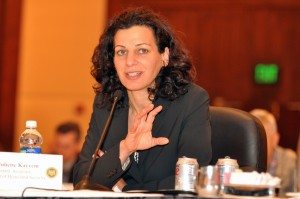Juliette Kayyem has spent over 15 years managing complex policy initiatives and organizing government responses to major crises in both state and federal government. Most recently, she was President Obama’s Assistant Secretary for Intergovernmental Affairs at the Department of Homeland Security. There she played a pivotal role in major operations including handling of the H1N1 pandemic and the BP Oil Spill response; she also organized major policy efforts in immigration reform and community resiliency. As a faculty member at Harvard’s Kennedy School of Government, she teaches new leaders in emergency management and homeland security. Kayyem has recently released a book called Security Mom: An Unclassified Guide to Protecting Our Homeland and Your Home. She is a graduate of both Harvard College (1991) and Harvard Law School (1995).
Harvard Political Review: You actually were a member of the IOP when you were at Harvard-how has this influenced the work you do now?
Juliette Kayyem: The IOP got me engaged in public service. In response I spent a lot of my career in public service and it introduced me to leaders in politics in all different realms, like elected office, policy, cabinet secretaries, in a way that you begin to realize that public service is very broad.
HPR: What is the biggest threat to our homeland security that we should be preparing for?
JK: There are an infinite number of threats that could scare us everyday. To me, the more important question is are we prepared to respond and be resilient in the face of threats that can range from two brothers at the Boston marathon to the Zika virus. A lot of my focus now is in support for response and recovery and thinking about building a more resilient nation. My new book is how to do that one home at a time.
HPR: Has America has been preparing correctly?
JK: It’s a mixed story, sometimes we overreacted, other times we might have under-reacted. One way to think about it is that there is no golden moment—I would describe it as the goldilocks phenomenon—and so we just have to keep trying. Because the threats will keep coming.
HPR: Is the threat of ISIS blown out of proportion?
JK: There are other threats that would have more catastrophic consequences, but I don’t deny that a terror incident is in fact different. It is purposeful violence in a way that does have an impact on society.
HPR: How do you think the current presidential candidates are changing the terrorism rhetoric? Is it going in a positive or negative direction?
JK: It is going very much in a negative direction. For someone like me—I’ve been in counter terrorism for a long time—the one attribute of American policy that has made us safer and stronger is our capacity to integrate and assimilate new populations that then consider the United States home. That is what Europe has failed to do. Going down any path which isolates a Muslim community that is integrated into American society will make us less safe over time.
HPR: Do you think the xenophobic rhetoric is reflective of a bottom up desire from the American people or is it coming from somewhere else?
JK: It is fear mongering—there has always been a nationalistic tone in American security politics that [the candidates] are playing up on. We probably have not braced ourselves for the kind of terror we are likely to face which is disruptions and violence but nothing that is of an existential nature.
HPR: What do you mean by an “existential nature”?
JK: ISIS isn’t going to bring down our democracy, and the presidential candidates should have more faith in this.
HPR: Have you been taken seriously as a female working in a largely male-dominated industry?
JK: I’ve had the same challenges as anyone who is trying to raise three kids. However it is incumbent on people like me, who reach these type of levels in predominately male dominated fields, to serve as a mentor. I wouldn’t say the sexism is a barrier, but it is a challenge to not have a peer group in your own profession. That has been a struggle at times.
HPR: What has it been like talking to your children about terrorism and the work you do?
JK: I’m not the best person to talk to because my children are so aware of it. But what I tell people, especially those with older kids, is that chances are if they have an iPhone they know. It is incumbent on parents to not overreact, or run for the hills, or pretend they can shield their kids from everything. It’s actually our job to put it into perspective for kids. It’s in the silences when nervousness and other fears grow. I remind people, and my kids, that there are benefits to our vulnerabilities: we get to travel, people come from around the world and things like that. To remember that America is vulnerable—and that is a good thing.
Image credit: Jim Greenhill/Wikimedia
